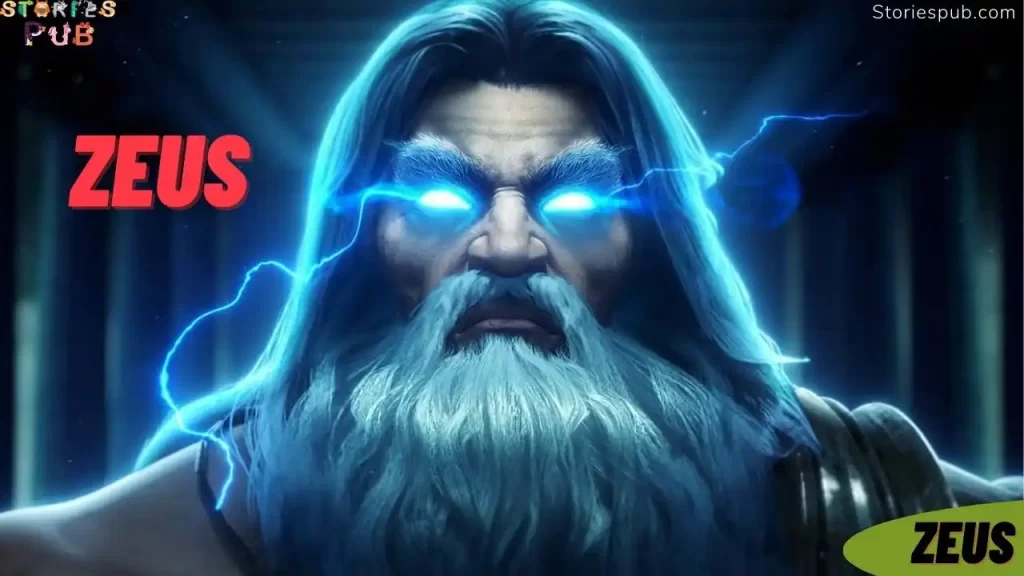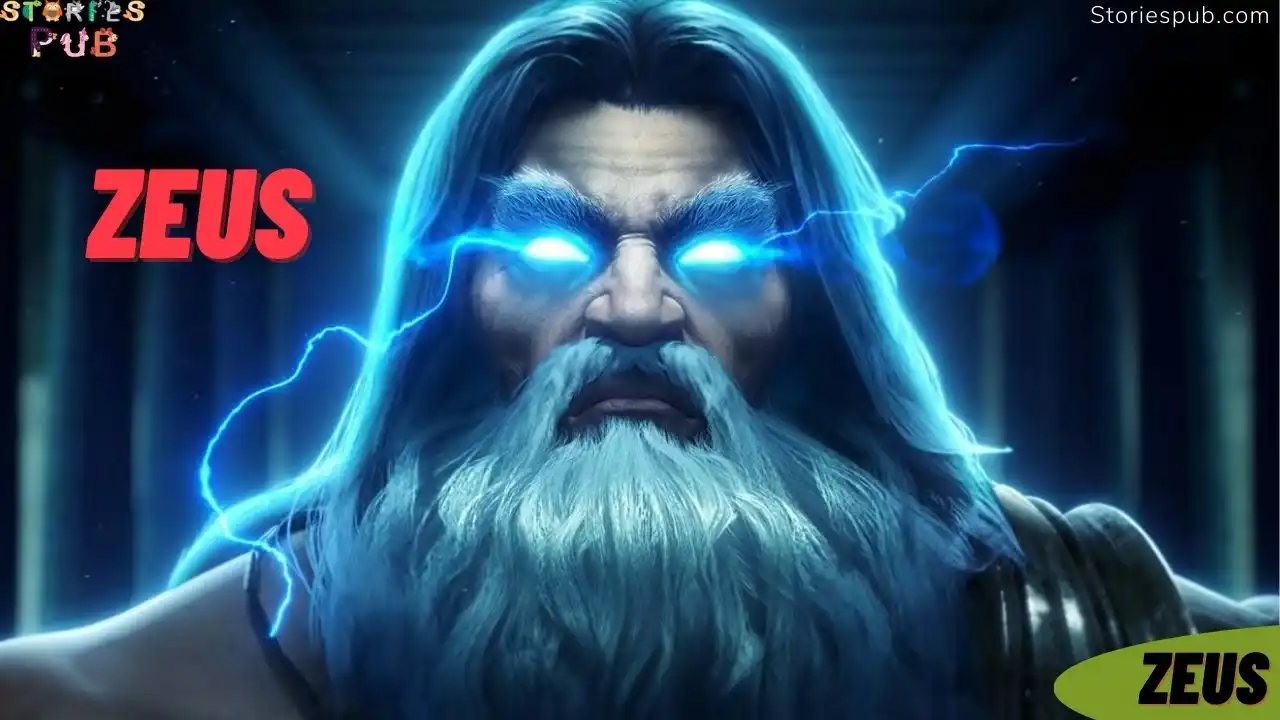The King of the Gods: Exploring the Power and Mythology of Zeus

Zeus is a major figure in Greek mythology and is often referred to as the “King of the Gods.” He is known as the god of the sky, lightning, thunder, law, order, and justice. As the son of Cronus and Rhea, he is a member of the first generation of the Olympian gods, who were believed to live on Mount Olympus.
A brief history of Zeus according to Greek mythology
Zeus was born on the island of Crete. He was part of the first generation of Olympian gods, who were believed to have overthrown the Titans and taken control of the cosmos. Zeus’s parents were Cronus and Rhea, who were both Titans. Cronus was the king of the Titans and had a reputation for being ruthless and paranoid. He feared that his children would one day overthrow him, just as he had overthrown his own father, Uranus.
You also would like to read List of Greek Goddesses
To prevent this from happening, Cronus swallowed his children as soon as they were born. However, Rhea, Zeus’s mother, managed to save him by tricking Cronus into swallowing a stone wrapped in swaddling clothes instead. Rhea then hid Zeus on the island of Crete, where he was raised in secret.
When Zeus reached adulthood, he led a rebellion against his father and the Titans, with the help of his siblings and other gods. After a long and brutal battle, the Olympians emerged victorious, and Zeus became the king of the gods.
The importance of Zeus in Greek mythology
Zeus was a central figure in Greek mythology, and his stories often revolve around his interactions with other gods, humans, and his numerous love affairs. He is regarded as one of the most powerful gods in the Greek pantheon and is often associated with the concept of justice, as he was believed to enforce the laws of the universe. His influence extended to many aspects of Greek life, including politics, art, and religion.
What makes Zeus the most powerful of the gods?
Zeus’s power and status as king of the gods made him the most powerful deity in Greek mythology. He was believed to control the sky, lightning, and thunder, which gave him control over the elements and the power to create or destroy. Also, people thought Zeus was fair and just, which added to his power and made him the best person to settle disputes between gods.
Zeus’s power and abilities
Zeus’ powers and abilities were many and varied. As the god of the sky, he was believed to control the weather, and his lightning bolts were a fearsome weapon. He was also known for his strength and his ability to shape-shift into various forms. In addition, Zeus had the power to grant favours to mortals, such as good weather for crops, protection in battle, or success in love.
Symbols and attributes of Zeus
Zeus was associated with several symbols and attributes, including the lightning bolt, the eagle, the oak tree, and the aegis, a shield that was often depicted with the head of Medusa on it. He was also often depicted holding a sceptre or a thunderbolt. These symbols and attributes represented his power and authority, as well as his connection to the natural world.
Zeus and his siblings
Zeus was one of six children born to the Titans Cronus and Rhea. He had five siblings, all of whom were also Olympian gods and goddesses with their own unique abilities and domains. The siblings of Zeus were Hestia, Demeter, Hera, Hades, and Poseidon.
Hestia, the firstborn of Cronus and Rhea, was the goddess of the hearth and home. She was known for her role in keeping the fires burning and was responsible for the household, making her one of the most important goddesses in ancient Greek society. Hestia was known for her peaceful and gentle nature, and she was one of the few gods who did not participate in the battles and conflicts that often took place among the Olympians.
You also would like to read Tales of Ancient Greek Heroes
Demeter, the goddess of agriculture, was responsible for the fertility of the earth and the harvest. She was often depicted holding a sheaf of wheat or a cornucopia, and her cult was an important part of Greek society. Hades kidnapped Persephone, the daughter of Demeter, and took her to the underworld. This was the start of the seasons and the cycle of life, death, and rebirth that happens every year.
Hera, the wife of Zeus, was the goddess of marriage and childbirth. She was known for her jealousy and her fierce protectiveness of her family, and she often punished those who crossed her or her husband. Hera was also associated with the peacock, which was considered a sacred animal in ancient Greece.
Hades, the god of the underworld, ruled over the dead and was responsible for maintaining order in the afterlife. He was often depicted as a dark and brooding figure, and he was feared by mortals and gods alike. Hades was also known for his role in the abduction of Persephone, which led to his marriage to the goddess of spring.
You also would like to read Mighty Hecatoncheires
Poseidon, the god of the sea, was one of the most powerful of the Olympian gods. He was known for his control over the waves and the weather, and he was often depicted carrying a trident, which he used to create earthquakes and storms. Poseidon was also linked to horses, and it was said that the first horse was made when he hit a rock with his trident.
Together, Zeus and his siblings were the most powerful and influential gods in Greek mythology. Their stories and deeds were important parts of ancient Greek culture, and people all over the world still find them interesting and inspiring.
Zeus’s wife:
Zeus was married to his sister Hera, who was the goddess of marriage and childbirth and queen of the gods. Hera was known for her beauty, wisdom, and fierce protection of her family and marriage. Even though Zeus had many affairs with other women, he stayed married to Hera as long as he was king of the gods.
Zeus’s children:
Zeus had many children with a variety of mortal women, goddesses, and even some animals. Some of his most well-known children include:
Athena: Born fully grown from Zeus’ forehead, Athena was the goddess of wisdom, warfare, and crafts. She was one of the most loved and respected gods, and wisdom, strategy, and winning were often linked to her.
Apollo: Apollo was the god of music, poetry, prophecy, and healing. He was known for his beauty and his ability to inspire awe and wonder in mortals and gods alike.
You also would like to read Zagreus: The Prince of the Dead
Artemis: Artemis was the goddess of the hunt, wild animals, and childbirth. She was known for her fierce independence and her devotion to the natural world.
Ares: Ares was the god of war, violence, and bloodshed. He was known for his hot-headedness and his love of conflict.
Dionysus: Dionysus was the god of wine, parties, and festivals. He was known for his wild, hedonistic celebrations and his ability to inspire ecstasy and passion in mortals.
Hermes: Hermes was the messenger of the gods and was associated with communication, commerce, and thievery. He was known for his speed, his wit, and his ability to move between the mortal and divine realms.
Persephone: Persephone was the goddess of the underworld and was married to Hades, Zeus’s brother. She was known for her beauty and her connection to the cycles of life, death, and rebirth.
You also would like to read Aeneas: The Hero of Troy
Hercules: Hercules was one of Zeus’s most famous children who was not a god. He was known for his incredible strength and his heroic deeds, which became legendary.
These are just a few of the many children that Zeus had throughout his long and powerful reign as king of the gods. His many children showed how strong and fertile he was, and they were important in many of the myths and stories about Zeus and the other Greek gods.
Zeus’s love affairs:
Zeus had a reputation as a philanderer, and he had many love affairs with both mortal women and goddesses. Some of his most famous love affairs include:
Io: Io was a mortal woman whom Zeus fell in love with and turned into a white heifer to protect her from his jealous wife, Hera.
Europa: Europa was a mortal woman whom Zeus abducted by transforming himself into a bull. He took her to Crete, where they had three sons.
You also would like to read Mythological Creatures in ancient Greek
Semele: Semele was a mortal woman whom Zeus fell in love with and had a child with, the god Dionysus. When Semele asked Zeus to reveal himself in his true form, she was consumed by his lightning bolt.
Leto: Leto was a goddess who had two children with Zeus, the twin gods Apollo and Artemis.
Callisto: Callisto was a nymph whom Zeus fell in love with and had a son with, the mortal Arcas. Hera, jealous of Zeus’s infidelity, turned Callisto into a bear, but Zeus later placed her in the stars as the constellation Ursa Major.
Alcmene: Alcmene was a regular woman who got pregnant by Zeus and gave birth to Heracles.
Zeus’s many love affairs often resulted in the birth of demigods and other supernatural beings, who played important roles in Greek mythology. Even though he cheated on his wife, Zeus was still one of the most important and revered gods in Greek religion.
Zeus’s weakness:
Zeus was one of the most powerful gods in the Greek pantheon, but he was not invulnerable. His main weakness was his insatiable appetite for women, which often put him at risk of being exposed and punished. He had a lot of affairs and had a lot of children, both human and divine. This made him fight with his wife, Hera, and put him in danger of being overthrown by his children.
You also would like to read Greek God Pan
Additionally, like all gods, Zeus was vulnerable to the power of the Fates, who controlled the course of destiny. Even Zeus could not change the fate that was assigned to him, and he was subject to the same cycle of birth, death, and rebirth as all living beings. This made him vulnerable to the power of prophecy, which could tell him his future and threaten his position as king of the gods.
Another weakness of Zeus was his tendency to act impulsively, especially when it came to matters of love and lust. He was known for his fiery temper and his willingness to use his power to get what he wanted. This made him often fight with his wife, Hera, and other gods, which put him in danger of losing his power and influence.
Who is Zeus afraid of?
In Greek mythology, there were few beings that Zeus truly feared. However, there were a few notable exceptions:
The Fates: The Fates were the three sisters who controlled the destiny of all living beings. Even Zeus could not change the fate that was assigned to him, and he was subject to the same cycle of birth, death, and rebirth as all living beings. This made him vulnerable to the power of prophecy, which could tell him his future and threaten his position as king of the gods.
You also would like to read Medusa
Typhon: Typhon was a monstrous creature with a hundred dragon heads and a body covered in serpents. He was so fearsome that even the gods trembled at the thought of him. When Typhon attacked the gods on Mount Olympus, Zeus was forced to flee and hide in Egypt. Eventually, with the help of his son Hermes and the cyclops, Zeus was able to defeat Typhon and restore order to the world.
Hera: Despite being Zeus’ wife and sister, Hera was a formidable opponent who often challenged Zeus’ authority and power. Her wrath was legendary, and she was known for her jealousy and vengefulness. In many myths, Hera plotted against Zeus and tried to undermine his authority, causing him to fear her wrath and try to appease her with gifts and flattery.
Zeus’s Role as King of the Gods
As the king of the gods, Zeus was responsible for maintaining order and justice in the world. He presided over the assembly of the gods on Mount Olympus and was responsible for making decisions that affected the entire pantheon. He was also in charge of making sure the rules of hospitality were followed. These rules said that the gods should welcome and protect guests and travelers.
Zeus’ Responsibilities in Greek Mythology
Zeus had many responsibilities in Greek mythology, including:
God of the Sky: Zeus was the god of the sky and was responsible for controlling the weather, including thunder, lightning, and rain.
Protector of the Weak: Zeus was also responsible for protecting the weak and the innocent. He was known for his kindness and mercy, and he often got in the middle of fights to help people who were being hurt or mistreated.
You also would like to read God of Messages Hermes
Upholder of Oaths: Zeus was the god of oaths and was responsible for ensuring that oaths and promises were kept. He punished those who broke their oaths, and he was known for his strict sense of justice.
Zeus’s Major Wars and Conflicts
Zeus was involved in many conflicts and wars in Greek mythology, including:
The Titanomachy: This was a war between the gods and the Titans, who were the previous rulers of the universe. Zeus led the gods to victory in this war, and he banished the Titans to the underworld.
The Gigantomachy: This was a war between the gods and the giants, who were born from the blood of the castrated Uranus. Zeus and the other gods fought and beat the giants and took control of the world.
The Trojan War: This was a legendary conflict between the Greeks and the Trojans that lasted for ten years. Zeus was one of the gods who intervened in the war, supporting both sides at different times.
Additionally, Zeus was involved in the war against the monster Typhon, who was said to be the deadliest monster in Greek mythology. Typhon was born to Gaia and Tartarus, and he had numerous heads and serpentine limbs. Zeus and the other gods fought a fierce battle against Typhon, with the outcome being uncertain at times. But in the end, Zeus won when he threw thunderbolts at Typhon and buried him under Mount Etna.
You also would like to read Nyx Greek Goddess
Zeus also played a significant role in the war between the gods and the giants. The Giants were the offspring of Gaia and Uranus and were known for their immense size and strength. In this conflict, Zeus and the other gods defeated the Giants and established their supremacy over the world. According to some legends, the Giants’ blood gave birth to a new race of people known as the Pygmies.
Apart from these major wars and conflicts, Zeus was also involved in many other smaller battles and conflicts. He was often asked to settle arguments between gods and people, and he was known for being able to bring peace and fairness.
Zeus’ weapon and its power
Zeus is famously associated with a powerful weapon: the thunderbolt or lightning bolt. This weapon is said to have been crafted by the Cyclops, the one-eyed giants who were the forgers of the gods.
The thunderbolt was more than just a physical weapon; it also represented Zeus’s power over the natural world, particularly the skies and the weather. In Greek mythology, Zeus was often shown throwing his thunderbolt at his enemies or making storms and other natural disasters with it.
You also would like to read Athena Greek virgin goddess
The lightning bolt was also a symbol of Zeus’ authority and position as king of the gods. When Zeus wielded the thunderbolt, it was a sign of his absolute power and sovereignty.
Overall, the thunderbolt was a potent symbol of Zeus’s power, and it played a significant role in many myths and stories involving the king of the gods.
Bonus Section
How did Zeus become the leader of the gods?
Zeus became the leader of the gods after a war with the Titans, who were the previous rulers of the universe. After the Titans were defeated, Zeus and his siblings divided the universe among themselves, with Zeus becoming the god of the sky and king of the gods.
Zeus’s Roman name
Zeus’s Roman name was Jupiter. In Roman mythology, Jupiter was the king of the gods and the god of the sky and thunder, similar to Zeus in Greek mythology.
Why did Zeus eat his wife?
Zeus did not eat his wife. However, there is a myth in which Kronos, Zeus’s father, ate his own children to prevent them from overthrowing him. Zeus was saved by his mother, Rhea, who tricked Kronos into swallowing a stone instead of the infant Zeus.
Description of Zeus’s appearance and personality
Zeus was typically depicted as a powerful, bearded man with a thunderbolt in his hand. He was often portrayed as regal and majestic, with a commanding presence. In terms of personality, Zeus was often seen as wise and just but also prone to anger and jealousy.
Who cut off Zeus’s head?
No one cut off Zeus’s head. However, there is a myth in which the Titan Kronos castrated his own father, Uranus, which caused his testicles to fall into the sea and create Aphrodite, the goddess of love.
What caused Zeus’s death?
There is no record of Zeus’s death. He was considered immortal and was believed to live forever as the king of the gods.
Who betrayed Zeus?
There were several instances of betrayal against Zeus. One of the most notable was the Titan Prometheus, who stole fire from the gods and gave it to humans. Zeus punished Prometheus by chaining him to a rock and having an eagle eat his liver every day, only for it to grow back every night.
Where did Zeus live?
Zeus was believed to live on Mount Olympus, the highest mountain in Greece. According to Greek mythology, Mount Olympus was the home of the gods, and Zeus lived there with the other Olympian gods and goddesses.
Fun facts about Zeus
Zeus was believed to control lightning and thunder, which made him one of the most powerful gods in the Greek pantheon.
In some myths, Zeus was believed to have the ability to transform into different animals, including a swan, a bull, and an eagle.
Zeus was often depicted holding a sceptre or a lightning bolt, which were symbols of his power.
The ancient Olympic Games, which were held every four years in honour of Zeus, were named after him.
Zeus was also associated with hospitality, and it was considered a sacred duty to show kindness to strangers in his name.
Conclusion
Zeus was a central figure in Greek mythology, known for his role as king of the gods and his many powers and responsibilities. He was respected and feared by the ancient Greeks, who thought he was in charge of the whole world and everything that happened in it.
Zeus’s importance in Greek mythology is reflected in the many stories and myths that feature him as a central character, including his many love affairs, conflicts, and wars. His family, including his siblings and children, were also powerful and important gods in their own rights.
You also would like to read Mighty Poseidon
In conclusion, Zeus’ enduring legacy in Greek mythology continues to captivate and fascinate people to this day. His larger-than-life personality and interesting stories make him an important part of ancient Greek culture and a source of endless fascination for both scholars and fans.
Hey kids, how much did you like The Mighty Poseidon: Mythology of the Greek God of the Sea? Please share your view in the comment box. Also, please share this story with your friends on social media so they can also enjoy it, and for more such stories, please bookmark storiespub.com.
Check out other stories that we have:





